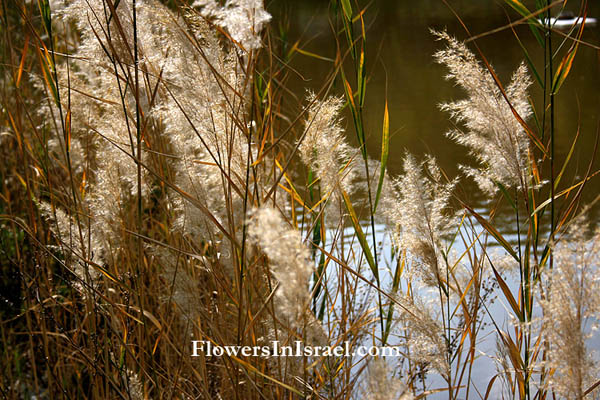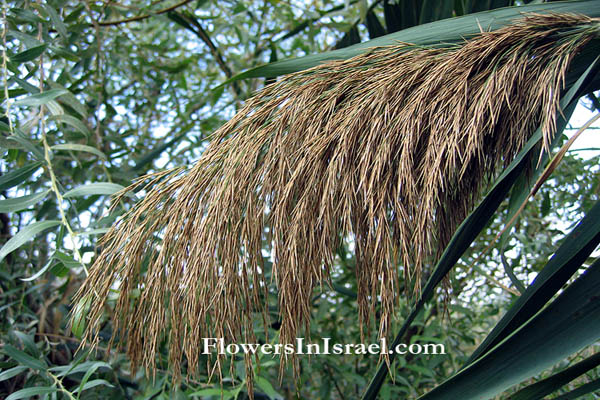|
|
| Life form: |
| Hemicryptophyte |
| Stems: |
| Culms 100-500 cm high, usually unbranched, glabrous |
| Leaves: |
| Alternate, entire |
| Inflorescence: |
| Panicle, feathery, 8-40 cm long, 6-20 cm broad |
| Flowers: |
| Green; upper glumes 4.5-7.5 mm, lower glumes 2.5-5.0 mm |
| Fruits / pods: |
| Caryopses; small; hilum short; pericarp fused; embryo large |
| Flowering Period: |
| January, October, November, December |
| Habitat: |
| Hydrophyte and hydro-halophytes; Salty and non-salty habitats |
| Distribution: |
| Mediterranean Woodlands and Shrublands, Semi-steppe shrublands, Shrub-steppes, Deserts and extreme deserts |
| Chorotype: |
| Plurireginalbor-trop |
| Summer shedding: |
| Perennating |

Derivation of the botanical name:
Phragmites, Greek phragma, a fence or screen, hedge; from the habit of hedgelike growth along ditches.
australis, southern.
communis, common.
The Hebrew word: קנה, kané , from Latin canna (“reed”), from Ancient Greek κάννα (kánna, “reed”), from Akkadian 𒄀 (qanû, “reed”), Aramaic: קניא, kanya, Arabic: קנא, kana; a stem, a cane, a stalk.
The word for reed, cane in the Hebrew, Arabic, and Egyptian languages was קנה, kaneh. The word passed over into Greek and Latin, and into the languages of western Europe. Since reeds were long and straight, they were often used as measuring rods. From this concept, "reed" came to mean "a standard" and ultimately, "an authoritative standard", or "law".
- The standard author abbreviation Cav. is used to indicate Antonio José Cavanilles (1745 – 1804), a Spanish taxonomic botanist.
- The standard author abbreviation Steud. is used to indicate Ernst Gottlieb von Steudel (1783 – 1856), a German physician and an authority on grasses.
- The standard author abbreviation Trin. is used to indicate Carl Bernhard von Trinius (1778 – 1844), aa German-born botanist.
Bible Resources:
- Genesis 41:2
when out of the river there came up seven cows, sleek and fat, and they grazed among the reeds.
- Genesis 41:18
when out of the river there came up seven cows, fat and sleek, and they grazed among the reeds.
- Exodus 2:3
But when she could hide him no longer, she got a papyrus basket for him and coated it with tar and pitch. Then she placed the child in it and put it among the reeds along the bank of the Nile.
- Exodus 2:5
Then Pharaoh’s daughter went down to the Nile to bathe, and her attendants were walking along the riverbank. She saw the basket among the reeds and sent her female slave to get it.
- 1 Kings 14:15
And the LORD will strike Israel, so that it will be like a reed swaying in the water. He will uproot Israel from this good land that he gave to their ancestors and scatter them beyond the Euphrates River, because they aroused the LORD’s anger by making Asherah poles.
- 2 Kings 18:21
Look, I know you are depending on Egypt, that splintered reed of a staff, which pierces the hand of anyone who leans on it! Such is Pharaoh king of Egypt to all who depend on him.
- Job 8:11
Can papyrus grow tall where there is no marsh? Can reeds thrive without water?
- Job 40:21
Under the lotus plants it lies, hidden among the reeds in the marsh.
- Job 41:20
Smoke pours from its nostrils as from a boiling pot over burning reeds.
- Psalm 68:30
Rebuke the beast among the reeds, the herd of bulls among the calves of the nations. Humbled, may the beast bring bars of silver. Scatter the nations who delight in war.
- Isaiah 9:14
So the LORD will cut off from Israel both head and tail, both palm branch and reed in a single day;
- Isaiah 19:6
The canals will stink; the streams of Egypt will dwindle and dry up. The reeds and rushes will wither,
- Isaiah 19:15
There is nothing Egypt can do— head or tail, palm branch or reed.
- Isaiah 35:7
The burning sand will become a pool, the thirsty ground bubbling springs. In the haunts where jackals once lay, grass and reeds and papyrus will grow.
- Isaiah 36:6
Look, I know you are depending on Egypt, that splintered reed of a staff, which pierces the hand of anyone who leans on it! Such is Pharaoh king of Egypt to all who depend on him.
- Isaiah 42:3
A bruised reed he will not break, and a smoldering wick he will not snuff out. In faithfulness he will bring forth justice;
- Isaiah 58:5
Is this the kind of fast I have chosen, only a day for people to humble themselves? Is it only for bowing one’s head like a reed and for lying in sackcloth and ashes? Is that what you call a fast, a day acceptable to the LORD?
- Ezekiel 29:6
Then all who live in Egypt will know that I am the LORD. “‘You have been a staff of reed for the people of Israel.
- Matthew 11:7
As John’s disciples were leaving, Jesus began to speak to the crowd about John: “What did you go out into the wilderness to see? A reed swayed by the wind?
- Matthew 12:20
A bruised reed he will not break, and a smoldering wick he will not snuff out, till he has brought justice through to victory.
- Luke 7:24
After John’s messengers left, Jesus began to speak to the crowd about John: “What did you go out into the wilderness to see? A reed swayed by the wind?
- Revelation 11:1
[ The Two Witnesses ] I was given a reed like a measuring rod and was told, “Go and measure the temple of God and the altar, with its worshipers.
|

